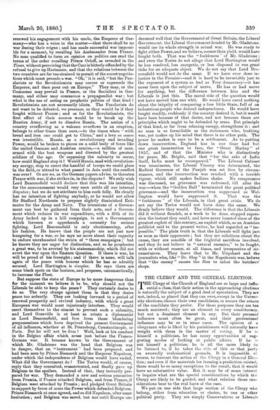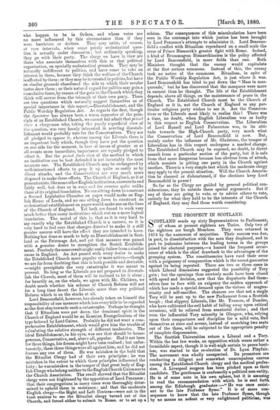THE CLERGY AND THE GENERAL ELECTION.
pliE Clergy of the Church of England are so large and irdtu- .1. ential a class, that their action in the approaching elections is naturally the subject of a good deal of speculation. They are not, indeed, so placed that they can ever, except in the Univer- sity elections, choose their own candidates, or secure the return of the candidate they prefer. For these purposes they are toe much scattered ; they are an element in every constituency, but not a dominant element in any. But their personal influence must often be great, and their professional influence may be so in some cases. The opinion of a clergyman who is liked by his parishioners will naturally have weight with them in the matter of voting. If he is himself a politician, he has many opportunities of sug- gesting modes of looking at public affairs. If he is not himself a politician, he is all the more likely to be listened to, if he takes the side of this or that party on avowedly ecclesiastical grounds. It is impossible, of course, to forecast the action of the Clergy in a General Elec- tion; and even if the materials for framing a prediction existed, there would be so many exceptions to the result, that it would have no substantive value. But it may be of some interest to inquire what are the special considerations by which the Clergy are likely to be guided, and what relation these con- siderations bear to the real facts of the case.
We put on one side that large section of the Clergy who belong, either from education or choice, to one or. other political party. They are simply Conservatives or Liberals who happen to be in Orders, and whose votes are no more influenced by this circumstance than if they were barristers or doctors. They may unite, of course, at rare intervals, when some purely ecclesiastical ques- tion is actually under discussion ; but ordinarily speaking, they go with their party. The clergy we have in view are those who associate themselves with this or that political organisation, on specially ecclesiastical grounds. They may be naturally indifferent to politics, and have come to take an interest in them, because they think the welfare of the Church is affected by them; or they may be interested in politics, but have on similar grounds abandoned the side to which their secular tastes drew them ; or their natural regard for politics may gain a cumulative force, by reason of the gain to the Church which they think will accrue from the triumph of their own party. There are two questions which naturally suggest themselves as of special importance in this aspect,—Disestablishment, and the Public Worship Regulation Act. As regards the first, though the Spectator has always been a warm supporter of the prin- ciple of an Established Church, we cannot but admit that prinul facie a clergyman who, taking the purely superficial view of the question, was very keenly interested in averting disestab- lishment would probably vote for the Conservatives. They are all pledged to oppose it, whereas among the Liberals there is an important body which, though they have put the question on one side for the moment, in face of issues of greater, or at all events more immediate, importance, are equally pledged to effect it. But the primei ,facie view of the method in which an institution can be best defended is not invariably the most accurate one. The Established Church may be endangered by well-intentioned efforts to prop it up quite as easily as by direct attacks, and the Conservatives are very much more disposed to make these efforts. The Church of England, as it at present exists, like some other English institutions, answers its end fairly well, but does so in ways and for reasons quite unlike those of its original foundation. No one sitting down to construct a Second Legislative Chamber on paper would make an Eng- lish House of Lords, and no one sitting down to construct an ecclesiastical establishment on paper would make one on the lines of the Church of England. Yet both are found to work very much better than many institutions which rest on a more logical foundation. The moral of this is, that as it is very hard to say exactly why the Established Church is a success, so it is very hard to feel sure that changes directed to make it a still greater success will have the effect they are intended to have. Nothing has done so much to help on Disestablishtuent in Scot- land as the Patronage Act, and yet that measure was passed with a genuine desire to strengthen the Scotch Establish- ment. Precisely the same result might easily follow from a similar cause in England. An Act passed with every desire to make the Established Church more popular or more active,—though we are far from doubting that this is both possible and desirable, —might precipitate the very catastrophe it was meant to prevent. So long as the Liberals are not prepared to disestab- lish the Church, most of them will be inclined to let it alone ; for heartily as, on the whole, we agree with Mr. Childers, we doubt much whether his scheme of Church Reform will not for a long time daunt the Liberals more than any political Reform which is on the stocks at all.
Lord Beaconsfield, however, has already taken on himself the responsibility of one measure which has every title to be regarded as the first step towards such a catastrophe. Perhaps he thought that if Ritualism were put down, the dominant spirit in the Church of England would be an Eraatian Evangelicalism of the type beloved by Lord Cairns. Probably he did not want a com- prehensive Establishment, which would give him the trouble of calculating the relative strength of different tendencies. The ideal Establishment, in his eyes, was one that should be homo- geneous, Conservative, and, above all, popular. Had it not been for three things, his dream might have been realised ; but unfor- tunately, these three things were all against him, and he did not foresee any one of them. He was mistaken in the hold that the Ritualist Clergy had of their own principles ; he was mistaken in the extent to which these principles influenced the laity ; he was mistaken in the temper of that great body of Eng- lish Clergy whobelong neither to the English Church Union nor to the Church Association. The result showed that the Ritualist clergy were not frightened by the apparition of Lord Penzance ; that their congregations in many cases were thoroughly deter- mined to uphold them in resistance ; and that the moderate English clergy—the Right and Left Centres—were not in the least anxious to see the Ritualist clergy turned out of the Church, and forced either to submit to Rome, or to set up a schism. The consequences of this miscalculation have been seen in the contempt into which justice has been brought by Lord Penzance's attempts to administer it. Lord Beacons- field's conflict with Ritualism reproduced on a small scale the error of Prince Bismarck's greater fight with Rome. Indeed, a kind of Brummagem Bismarcicianism is the policy affected by Lord Beaconsfield, in more fields than one. Both Ministers thought that the enemy would capitulate at the first serious summons. Instead of this, the enemy took no notice of the summons. Ritualism, in spite of the Public Worship Regulation Act, is just where it was. Lord Beaconsfield has tried to put down the "Mass in mas- querade," but he has discovered that the masquers were more in earnest than he thought. The life of the Establishment depends, above all things, on the maintenance of peace in the Church. The Established Church must be the Church of England as it is, not the Church of England as any par- ticular religious party wishes to see it. Are the Conserva- tives or the Liberals most likely to realise this ? There was a time, no doubt, when English Liberalism was as faulty in this respect as English Conservatism. The Liberalism of Lord Russell and Lord Palmerston was, in its atti- tude towards the High-Church party, very much what the Conservatism of Lord Beaconsfield is now. But, mainly under the influence of Mr. Gladstone, the temper of Liberalism has in this respect undergone a marked change. The Established Church may be exposed, no doubt, to direct assault from a particular section of the party, but it is safe from that more dangerous because less obvious form of attack, which consists in pitting one party in the Church against another. There is a very simple test which the moderate clergy may apply to the present situation. Will the Church Associa- tion be cheered or disheartened, if the elections keep Lord Beaconsfield in power?
So far as the Clergy are guided by general political con- siderations, they lie outside these special arguments. But if any of them are going to vote, or to advise others to vote, entirely for what they hold to be the interests of the Church of England, they may find them worth considering.



































 Previous page
Previous page